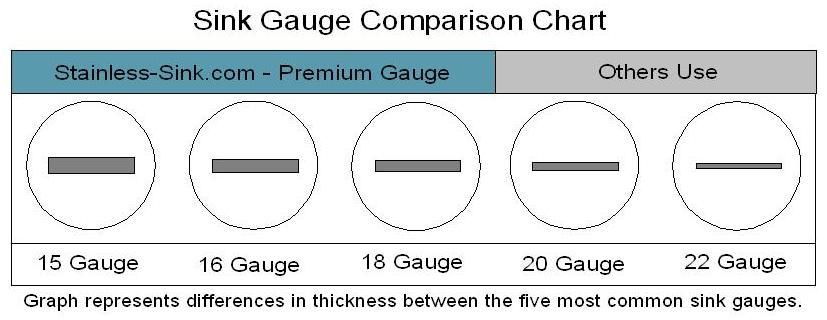Knowing about the product you’re planning to buy is essential if you’re hoping to make a good decision.
Something as small as the thickness of the sink can play a major role in determining how long it will last.
To aid your buying decisions, I have written an article about the best gauge available for stainless steel sinks.
So, Let’s dig in!
What is Gauge for stainless steel sink?
Just like many other factors, you should consider the gauge of the stainless steel sink that you’re buying.
Before we get into the best gauge available for stainless steel sinks, we first have to know precisely what gauge means.
Gauge thickness, or gauge, is a number that tells you the thickness of your sink. For stainless steel sinks, there are a lot of gauges that are available in the market. These range from 18 to 23 usually.

These refer to the thickness of the steel used in the stainless steel sink. The lower the number, the thicker will be the stainless steel that is used.
The Ideal Gauge For A Stainless Steel Sink
Stainless steel sinks have several different gauges in which the sink is available. If you’re getting a 22 gauge stainless steel sink, just know that the metal will be more prone to vibrations and denting.
Moreover, it would not be able to handle as much weight as a sink with a lower gauge potentially can. If the gauge is higher for a sink, the edges will be even more thinner, leading to the sink being very fragile. The whole of the basin could fall off.
As a general rule of thumb, the lower the number for the gauge, the better. A lower gauge means a much thicker sink which can offer you a lot of benefits that thinner sinks cannot.
How Thick Are Different Gauges?
Well, when you compare a 16 gauge sink with a 24 gauge sink, you will find out that the 24 gauge sink is only 40% as thick as the 16 gauge sink.
The amount of material used in higher gauges is a lot lesser than lower gauges. They use around 50% less material. For this reason, the higher gauge sinks suffer from a lot of quality issues when compared with lower gauge sinks.
The Reason Why Lower Gauge Sinks Are Better
Lower gauge sinks offer a variety of different advantages over higher gauge sinks. For example, the sink’s denting problem pretty much disappears when it comes to a lower gauge sink.
However, sinks of a higher gauge dent very quickly. Moreover, they make a lot of noise, which means that your sink will be causing a lot of ruckuses every time you turn the tap water on.

Furthermore, higher gauge sinks are also more prone to scratches as well. Lower gauge sinks also have a life considerably higher than the higher gauge sinks due to their thickness.
Simultaneously, a thicker sink does not necessarily mean that you will get a better quality sink. There are many other features that you should consider before going for a particular type of sink.
What Gauge Should Be Selected?
Ideally, you should go for a 16 gauge sink, but know that 16 and 18 gauge sinks do not have that much of a difference when it comes to the thickness of the sink.
Going for an 18 gauge sink looks like a smart choice as you would get the perfect price as well as an ideal thickness.
However, keep in mind that thicker does not always mean better. The sink could be of a lower gauge but still could be of inferior quality when compared to a higher gauge sink. Make an informed decision about the product you’re going for and the company that’s manufacturing it.
Should I Go For The 16 Gauge Sink Or The 18 Gauge Sink?
Considering the prices, if you’re getting both the sinks at identical prices, then you should go for the 16 gauge sink as it offers more value than the 18 gauge sink.
If you’re talking about the measurements, an 18 gauge sink is only 20% thinner than a 16 gauge sink. An 18 gauge sink is 0.05 inches thick, while the 16 gauge alternative is around 0.0625 inches.
As you can see, there is not much of a noticeable difference. So, even if you go for an 18 gauge sink, you’re not losing much value if the price difference is making up for it.
However, the 16 gauge sink is also not that expensive when compared to the 18 gauge alternative. In the market, both the sinks are more or less of the same price. Considering the deal you’re getting, you should consider the different alternatives available to you.
Conclusion
To summarize, a lower gauge sink is better than a higher gauge sink because of the strength and other benefits it offers.
You should go for either the 16 or 18 gauge sink, based on the price you’re getting for the sink.
I hope this article helped you in making your decision.
Good luck!










